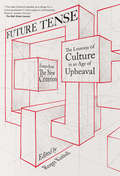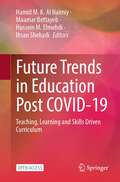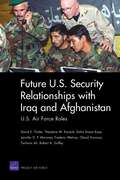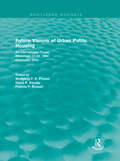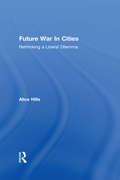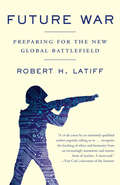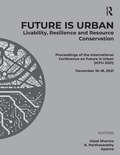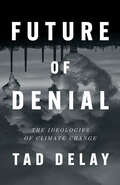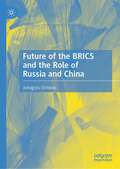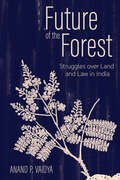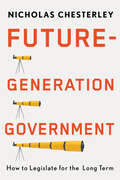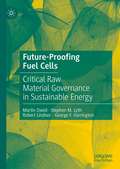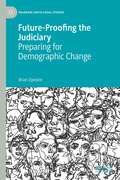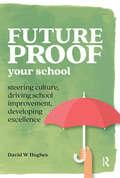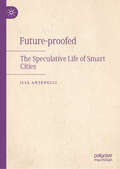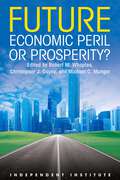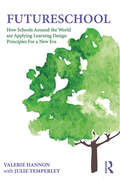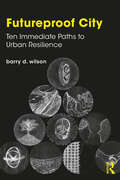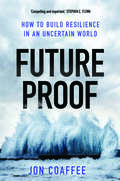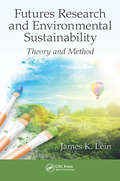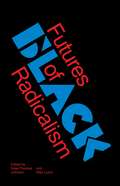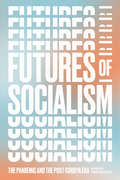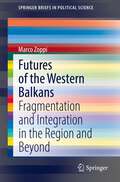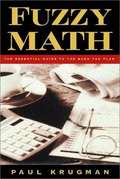- Table View
- List View
Future Tense
by Roger KimballWe are living in an age of unprecedented upheaval. The future of Western culture is uncertain. America's economic and political vitality are more fragile than ever. The preservation of tradition is far from guaranteed.Many have observed that we are living through a world historical moment of which Hegel spoke: a time when many of the traditional assumptions about the shape and future of culture are suddenly in play. As The New Criterion embarks on its fourth decade of publication, the magazine commemorates its commitment to the civilizing values of informed criticism with the publication of Future Tense: The Lessons of Culture in an Age of Upheaval.Compiling the writings of some of the greatest essayists of our time, Future Tense examines this pivotal period through a variety of lenses. Beginning with a meditation on memorials after the 9/11 attacks (Michael J. Lewis), the essays address patriotism in relation to Pericles (Victor Davis Hanson), twenty-first century American pride and leadership (Andrew Roberts), the future of religion in America (David Bentley Hart), and the unwinding of the welfare state (Kevin D. Williamson). Continuing this arc, pieces examine self-knowledge and modern technology (Anthony Daniels), the cultural capital of museums (James Panero), and the difficulties of making law in the modern world (Andrew C. McCarthy). In its penultimate essay, the book explores the possibility of a forthcoming political revolution (James Piereson), then closes with a reflection of culture's role in the economy of life and the fragility of civilization (Roger Kimball).Taken together, these prominent writers demonstrate an acute understanding of the value of Western thought as well as the challenges it faces. Future Tense is an engaging discourse on the prospects of society and an important collection for anyone concerned with the longevity of traditional culture.
Future Trends in Education Post COVID-19: Teaching, Learning and Skills Driven Curriculum
by Hamid M. K. Al Naimiy Maamar Bettayeb Hussein M. Elmehdi Ihsan ShehadiThis open access book presents the proceedings of the first post COVID-19 conference on Education at the University of Sharjah, United Arab Emirates, on March 14-16, 2022. The book offers state-of-the-art approaches and methodologies in education post-COVID-19. It showcases emerging technology utilization in improving the quality of education, teaching and learning. It discusses the transformation of the curriculum, such as course design and delivery, assessment, and instructional methodologies that focus on employment readiness for the ever-evolving job market. Contributions include a wide range of topics such as online education, curriculum development, artificial intelligence, academic accreditation for hybrid & online learning. Given its scope, the book is essential reading for scholars, students, policy-makers, and education practitioners interested in a better understanding of technological innovations.
Future U.S. Security Relationships with Iraq and Afghanistan
by Frederic Wehrey David E. Thaler Dalia Dassa Kaye Jennifer D. Moroney Theodore W. KarasikThe authors describe possible regional security structures and bilateral U.S. relationships with Iraq and Afghanistan. They recommend that the United States offer a wide range of security cooperation activities to compatible future governments in Kabul and Baghdad but should also plan to hedge against less-favorable contingencies. They emphasize that the U.S. Air Force should expect to remain heavily tasked for the foreseeable future.
Future Visions of Urban Public Housing: An International Forum, November 17-20, 1994 (Routledge Revivals)
by Wolfgang F. Preiser David P. Varady Francis P. RussellFirst published in 1994, this book brings together the papers presented at the International Forum on ‘Future Visions of Urban Public Housing’ held on November 17-20, 1994 in Cincinnati, Ohio. Participants included public housing officials, academics, practitioners and public housing residents who came together to debate, compare and analyse practices and issues in urban and public housing in industrialised nations. The 55 collected papers address the following key topics: public housing policy; comprehensive neighbourhood planning for public housing; public housing in the urban design context; quality of design standards and guidelines for public housing; resident participation and enhanced self-sufficiency in public housing; public housing alternatives; revitalising and rehabilitating public housing; the Elderly, Children, and special populations in public housing. The findings suggest new directions for policy and agendas for action.
Future War In Cities: Rethinking a Liberal Dilemma
by Alice HillsThis book is the first full-length study of a key security issue confronting the west in the twenty-first century, urban military operations - as currently being undertaken by US and UK forces in Iraq. It relates military operations in cities to the wider study of conflict and security in an era of urbanisation, expeditionary warfare and new power
Future War: Preparing for the New Global Battlefield
by Robert H. LatiffAn urgent, prescient, and expert look at how future technology will change virtually every aspect of war as we know it and how we can respond to the serious national security challenges ahead. Future war is almost here: battles fought in cyberspace; biologically enhanced soldiers; autonomous systems that can process information and strike violently before a human being can blink. A leading expert on the place of technology in war and intelligence, Robert H. Latiff, now teaching at the University of Notre Dame, has spent a career in the military researching and developing new combat technologies, observing the cost of our unquestioning embrace of innovation. At its best, advanced technology acts faster than ever to save the lives of soldiers; at its worst, the deployment of insufficiently considered new technology can have devastating unintended or long-term consequences. The question of whether we can is followed, all too infrequently, by the question of whether we should. In Future War, Latiff maps out the changing ways of war and the weapons technologies we will use to fight them, seeking to describe the ramifications of those changes and what it will mean in the future to be a soldier. He also recognizes that the fortunes of a nation are inextricably linked with its national defense, and how its citizens understand the importance of when, how, and according to what rules we fight. What will war mean to the average American? Are our leaders sufficiently sensitized to the implications of the new ways of fighting? How are the attitudes of individuals and civilian institutions shaped by the wars we fight and the means we use to fight them? And, of key importance: How will soldiers themselves think about war and their roles within it? The evolving, complex world of conflict and technology demands that we pay more attention to the issues that will confront us, before it is too late to control them. Decrying what he describes as a "broken" relationship between the military and the public it serves, Latiff issues a bold wake-up call to military planners and weapons technologists, decision makers, and the nation as a whole as we prepare for a very different future.
Future is Urban: Proceedings of the International Conference on FUTURE IS URBAN: Livability, Resilience and Resource Conservation (ICFU 2021), December 16–18, 2021
by R. Parthasarathy Utpal SharmaCities have played an important role in our lives since the dawn of civilization. However, cities are slowly becoming overwhelmed and therefore intervention is desirable towards green, blue and egalitarian nature. Even with current urban issues, we must rise to the occasion as professionals to create cities that are social, cities that take care of the environment, and cities that are digital. Increased citizen participation is indispensable in this process. The ‘International Conference on Future is Urban (IFCU’ 21) Dec 16-18, 2021, Ahmedabad, India’, takes into account Livability, Resilience & Resource Conservation for planning Future and cities in future.
Future of Denial: The Ideologies of Climate Change
by Tad DeLay"Tad DeLay is one of the most important and disquieting theorists of consciousness and politics writing today. His work is indispensable."—China Miéville, author of OctoberCapitalism is an ecocidal engine constantly regenerating climate change denialThe age of denial is over, we are told. Yet emissions continue to rise while gimmicks, graft, and green- washing distract the public from the climate violence suffered by the vulnerable. This timely, interdisciplinary contribution to the environmental humanities draws on the latest climatology, the first shoots of an energy transition, critical theory, Earth&’s paleoclimate history, and trends in border violence to answer the most pressing question of our age: Why do we continue to squander the short time we have left?The symptoms suggest society&’s inability to adjust is profound. Near Portland, militias incapable of accepting that the world is warming respond to a wildfire by hunting for imaginary left-wing arsonists. Europe erects nets in the Aegean Sea to capture migrants fleeing drought and war. An airline claims to be carbon neutral thanks to bogus cheap offsets. Drone strikes hit people living along the aridity line. Yes, Exxon knew as early as the 1970s, but the fundamental physics of carbon dioxide warming the Earth was already understood before the American Civil War.Will capitalists ever voluntarily walk away from hundreds of trillions of dollars in fossil fuels unless they are forced to do so? And, if not, who will apply the necessary pressure?
Future of the BRICS and the Role of Russia and China
by Junuguru SrinivasThe book explains the rise of BRICS as a decisive group in the present world affairs. It emphasizes the significance of Russian and Chinese foreign policies concerning the BRICS group and how these two countries are using the group to promote their national interests. It also examines the causes of close association of Russia and China within the BRICS group. It illuminates the changing political dynamics of the world. This research contains the scope to unravel the strength of BRICS and Russia and China's foreign policy strategies. The study explains the change in global politics in post covid-19 international affairs. It analyses whether BRICS has the potential to play a decisive role in emerging international politics.The methodology adopted consists of three components: Quantitative method and Qualitative method along with a field trip to Russia to conduct surveys and interviews. The approach has been analytical and descriptive, and both primary and secondary sources have been consulted.
Future of the Forest: Struggles over Land and Law in India (Cornell Series on Land: New Perspectives on Territory, Development, and Environment)
by Anand P. VaidyaFuture of the Forest is the story of legal transformations of forests across India through collective action. Since the nineteenth century, Indian forest dwellers have been unable to enforce their claims to the land on which they live or the products of it that they use. But at the turn of the twenty-first century, a new national movement led to the passage of the Forest Rights Act, a landmark law that recognizes the tenure and use rights of India's millions of landless forest dwellers. Anand P. Vaidya tracks the Forest Rights Act from the movements that pushed for its passage to its drafting—and the many revisions it underwent to satisfy coalitions of local peoples, conservationists, and a wide spectrum of political parties and movements—and finally to its impact on two neighboring villages in central India's forest belt. The forests have seen a long history of political authority enacted to the benefit of the powerful; Future of the Forest follows the work of activists and forest dwellers who turned to the law to shift this balance of power.
Future-Generation Government: How to Legislate for the Long Term
by Nicholas ChesterleyIn the decades preceding COVID-19 there were nine pandemics or near-pandemics, from SARS to Ebola. Despite this turbulent recent history, many governments were unprepared for the recent pandemic and remain ill-equipped for the next.Our impact on future generations has never been greater, and the challenges we face will increasingly play out over the long term. Climate change is accelerating, antibiotic resistance is rising, underground aquifers are depleting, natural disasters catch us off guard, fish stocks are dwindling, and automation and population aging may transform our economies. Drawing on insights from behavioural science, Future-Generation Government offers a fresh perspective on short-termism and proposes clear, practical reforms that can help leaders respond to tomorrow’s challenges without compromising today’s democratic rights and freedoms.People value the present over the future, research shows, so governments balance the scales by rewarding future-planning behaviours: granting tax deductions for retirement savings or supporting educational savings, for example. Future-Generation Government explains how individuals, in turn, should reward our governments for making durable policy decisions that anticipate future crises.
Future-Proofing Fuel Cells: Critical Raw Material Governance in Sustainable Energy
by Robert Lindner Martin David Stephen M. Lyth George F. HarringtonAs the world accelerates towards a renewable energy transition, the demand for critical raw materials (CRMs) for energy generation, conversion, and storage technologies is seeing a drastic increase. Such materials are not only subject to limited supply and extreme price volatility but can also represent serious burdens to the environment, to human health, and also to socio-political systems. Taking an interdisciplinary perspective, this book provides a novel perspective on the discussion about material dependencies of energy technologies. It examines CRMs use in fuel cells, an emerging energy conversion technology, and discusses governance strategies for early-stage fuel cell development to predict and avoid potential issues. This will be an invaluable resource for researchers in energy studies, engineering, sociology and political science as well as those with a general interest in this field looking for an accessible overview.
Future-Proofing the Judiciary: Preparing for Demographic Change (Palgrave Socio-Legal Studies)
by Brian OpeskinThis book reinvigorates the field of socio-legal inquiry examining the relationship between law and demography. Originally conceived as 'population law' in the 1960s following a growth in population and a use of law to temper population growth, this book takes a new approach by examining how population change can affect the legal system, rather than the converse. It analyses the impact of demographic change on the judicial system, with a geographic focus on Australian courts but with global insights and it raises questions about institutional structures. Through four case studies, it examines how demographic change impacts on the judicial system and how should the judicial system adapt to embody a greater preparedness for the demographic changes that lie ahead? It makes recommendations for reform and speaks to applied demographers, socio-legal scholars, and those interested in judicial institutions.
Future-proof Your School: Steering culture, driving school improvement, developing excellence (Practical Teaching)
by David HughesWouldn’t it be great if you could equip your school and yourself to face whatever the future might throw at you!Schools face myriad calls on their time and creativity yet have finite internal resources to respond to them. This can result in piecemeal changes, and reactive rather than pro-active approaches. This book reduces, filters and prioritises the demands on staff energy to the central task of all schools - to achieve the best engagement of and learning outcomes for all learners (including the staff themselves).Schools often feel constrained by their current context, their previous performance, their demographics or available staff. This book provides an holistic and effective approach to change management that is simple, engages all stakeholders, is built around the current expertise and culture of the school and, most importantly, is sustainable.It is suitable for headteachers, senior or aspiring leaders, and those driving change through initiatives, but also individual teachers who are interested in effective practice as a route towards personal well-being and professional satisfaction.
Future-proofed: The Speculative Life of Smart Cities
by Ilia AntenucciEfficient, inclusive, sustainable: these are only some of the concepts through which smart cities have been marketed globally, over the past fifteen years at least. But what has really driven smart city projects, governance, and economies? This book argues it is speculation: not merely finance, but a much broader technopolitical force seeking to calculate and shape the future. Smart cities have been testbeds for new technological products, governed through preemptive analytics, and fuelled by high-risk financial investments. Drawing on case studies from Kolkata and Cape Town, this book illustrates how smart city technologies speculate on the future to govern and monetise the present. Today, smart cities might have lost some of their hype already, but their legacies are here to stay, and their ethical and political implications appear more critical than ever. This book offers insights into the speculative forces that undergird urban &‘smartness&’, and into their implications on everyday life, spatial justice, and citizens&’ rights.
Future: Economic Peril or Prosperity?
byWhat will the economy look like in fifty years? How will our lives as consumers and workers be transformed by the coming innovations in technology, the marketplace, and the workplace? How will changes in demographics and dependency affect our political system? Will economic freedom rise or fall? What, if anything, would greater prosperity do for one&’s total well-being?Future: Economic Peril or Prosperity? poses these and related questions to a diverse group of economists whose predictions will inspire thoughtful consideration and debate. As co-editor Robert M. Whaples writes in the introductory chapter, &“The predicted changes range from innocent innovations that will make life a bit more comfortable...to potentially chilling technologies that might strip our human dignity.&” Just as important as the book&’s predictions are its insights into how we should think about an uncertain future. As humorist and social critic P. J. O&’Rourke shows in his erudite chapter on self-fulfilling prophecies, wildly wrong predictions are not limited to the likes of a Nostradamous or a Karl Marx: even a Nobel laureate economist running a billion-dollar hedge fund can lose the farm (and other people&’s money) through an overly confident misreading of the economic tea leaves. And yet, perhaps only by delving more deeply into long-term forecasting, and reflecting on past mistakes, can we minimize the hubris that so often clouds the judgments of prognosticators in academia, business, and—perhaps especially—government. Informative, contentious, and at times inspirational, Future: Economic Peril or Prosperity? is an invaluable aid for anyone who understands the need to prepare for the future, even if that future cannot be fully anticipated.
FutureSchool: How Schools Around the World are Applying Learning Design Principles For a New Era
by Julie Temperley Valerie HannonWhat will the schools of the future look like? What will guide their design, and what is happening now to create them? As we enter the age of disruption and hyperchange, it has become increasingly clear that our education systems are not adequate to the task of enabling young people to thrive in a very different future. FutureSchool offers system leaders, principals, and teachers research-based design principles upon which the evolution of schools might be based. Shaped by an awareness of changing economies, technology, and the climate emergency, it suggests specific ways that leaders can address the challenges of moving forward, grasping the opportunities presented by the disruption of the COVID-19 pandemic. Presenting six ‘archetypes for the future’ – key missions that are central to the future of humanity – it offers inspiring examples of practice that are not just theoretical but well-advanced in schools across the world, practice that is grounded in principles that are central to a new learning paradigm. This book offers an answer and presents a vision that is engaging, inspiring, and intent on enabling success for all learners. This book will provide inspiration and practical guidance for leaders, teachers, and parents who want to see schools rapidly evolve to become the institutions we really need.
Futureproof City: Ten Immediate Paths to Urban Resilience
by Barry D. WilsonThe Futureproof City creates adaptability and resiliency in the face of the unknown challenges resulting from technological change, population explosion, global pandemic, and environmental crisis. A paradigm shift is urgently required in the means of conceiving, delivering, and managing city development to create better places to live. This book brings to the fore many new solutions currently being proposed and piloted globally, identifying ten key areas affecting the physical fabric of our cities where governments, planners, investors, and the individuals responsible for shaping lives can refocus their understanding, priorities, and funding in order to more effectively utilise the limited financial, natural, and time resources available. It will be key reading for every policy maker and professional working in sustainability, development, technology, health and welfare, investment, and risk issues in cities today.
Futureproof: How to Build Resilience in an Uncertain World
by Jon CoaffeeA compelling and definitive account of why we need to radically rethink our approach to dealing with catastrophic events Catastrophic events such as 9/11, Hurricane Katrina, and the Tohoku "Triple Disaster" of earthquake, tsunami, and nuclear meltdown that hit the eastern seaboard of Japan in 2012 are seen as surprises that have a low probability of occurring but have a debilitating impact when they do. In this eye-opening journey through modern and ancient risk management practices, Jon Coaffee explains why we need to find a new way to navigate the deeply uncertain world that we live in. Examining how governments have responded to terrorist threats, climate change, and natural hazards, Coaffee shows how and why these measures have proven inadequate and what should be done to make us more resilient. While conventional approaches have focused on planning and preparing for disruptions and enhanced our ability to "bounce back," our focus should be on anticipating future challenges and enhancing our capacity to adapt to new threats.
Futures Research and Environmental Sustainability: Theory and Method
by James K. LeinThis book explores the challenges of presenting sustainability as a more actionable or practical concept and identifying approaches that might offer useful assistance in addressing the temporal and spatial representation of sustainability. The underlying premise of this book is that sustainability is a state realized in the future. In that future there is a geographic arrangement of society and economy that agrees with its environmental setting. This future perspective introduces a little examined subject area that can lend significant content to the sustainability challenge: Futures Research.
Futures and Fictions
by Simon O'Sullivan Henriette Gunkell Ayesha HameedFutures and Fictions is a book of essays and conversations that explore possibilities for a different ‘political imaginary’ or, more simply, the imagining and imaging of alternate narratives and image-worlds that might be pitched against the impasses of our neoliberal present. In particular, the book contributes to prescient discussions around decolonization, post-capitalism and new kinds of social movements – exploring the intersections of these with contemporary art practice and visual culture. Contributions range from work on science, sonic and financial fictions and alternative space-time plots to myths and images generated by marginalized and ‘minor’ communities, queer-feminist strategies of fictioning, and the production of new Afro- and other futurisms.
Futures of Black Radicalism
by Gaye Theresa Johnson Alex LubinWith racial justice struggles on the rise, a probing collection considers the past and future of Black radicalismBlack rebellion has returned. Dramatic protests have risen up in scores of cities and campuses; there is renewed engagement with the history of Black radical movements and thought. Here, key intellectuals—inspired by the new movements and by the seminal work of the scholar Cedric J. Robinson—recall the powerful tradition of Black radicalism while defining new directions for the activists and thinkers it inspires. In a time when activists in Ferguson, Palestine, Baltimore, and Hong Kong immediately connect across vast distances, this book makes clear that new Black radical politics is thoroughly internationalist and redraws the links between Black resistance and anti-capitalism. Featuring the key voices in this new intellectual wave, this collection outlines one of the most vibrant areas of thought today. With contributions from Greg Burris, Jordan T. Camp, Angela Davis, Ruth Wilson Gilmore, Avery F. Gordon, Stefano Harney, Christina Heatherton, Robin D.G. Kelley, George Lipsitz, Fred Moten, Paul Ortiz, Steven Osuna, Kwame M. Phillips, Shana L. Redmond, Cedric J. Robinson, Elizabeth P. Robinson, Nikhil Pal Singh, Damien M. Sojoyner, Darryl C. Thomas, and Françoise Vergès.
Futures of Socialism: The Pandemic and the Post-Corbyn Era
by Grace BlakeleyHow should the left respond to electoral defeat, the leadership of Keir Starmer and a global crisis?British politics is in an extraordinary place. Grace Blakeley introduces an indispensable collection of analysis and comment. In Futures of Socialism, Sam Gindin and James Meadway reassess socialist strategy after the coronavirus; Dalia Gebrial and Siân Errington debate austerity and precarity; Joshua Virasami and Simukai Chigudu explore anti-racism and the legacy of Empire; and Leo Panitch and Momentum co-founder James Schneider probe the limits of parliamentary socialism. Chris Saltmarsh assesses the prospects for an eco-socialist Green New Deal and Cat Hobbs argues for the ongoing centrality of public ownership to socialist policy. Futures of Socialism takes an in-depth look at the reasons for Labour&’s 2019 election defeat, with Unite&’s Andrew Murray on Labour&’s Brexit position, Tom Mills on the British media, Gargi Bhattacharyya and Jeremy Gilbert on better ways to build a political project, and Keir Milburn on generation left. The anthology also compares the fortunes of the British left with socialist movements overseas, in despatches from Europe and America. Blakeley draws on the talents of all sections of the post-Corbyn left to survey the prospects of &“a movement that has dominated the horizons of our lives.&”
Futures of the Western Balkans: Fragmentation and Integration in the Region and Beyond (SpringerBriefs in Political Science)
by Marco ZoppiThis Brief provides a survey of key political, social, and economic issues affecting the Western Balkans region. Taking a two-pronged conceptual approach focusing on fragmentation and integration, the volume highlights commonalities and differences in a number of simultaneous dynamics currently characterizing the region: Europeanization and EU access, market integration, and migration and socio-demographic transformations. Stressing the interconnectedness of these issues, the volume synthesizes key questions for the future of the region, such as the relationship between socio-demographic trends and economic development, the effects of depopulation on further EU integration, and the economic and political repercussions of enhanced intra-regional trade. Explicitly interdisciplinary, this Brief will be useful for researchers and students specializing in the Balkans and Western Balkans, post-socialist countries, European affairs, enlargement, foreign policy, international relations, regional studies, economics, economic transition, and socio-demographics.
Fuzzy Math: The Essential Guide to the Bush Tax Plan
by Paul Krugman"This book puts Paul Krugman's analysis, and powers of explanation firmly at the center of the debate about what to do with more than $5 trillion." "The United States will soon decide how to spend what is forecast as a $5.6 trillion surplus. President George W. Bush has already sent his proposed tax cuts to Congress. Democrats have countered with their own initiatives. The question of whether to enact tax cuts has shifted to when? and by how much?" "This book, dissects the Bush and other tax proposals and shows us who wins, who loses, and how quickly the tax cuts will consume the surplus."--BOOK JACKET.
